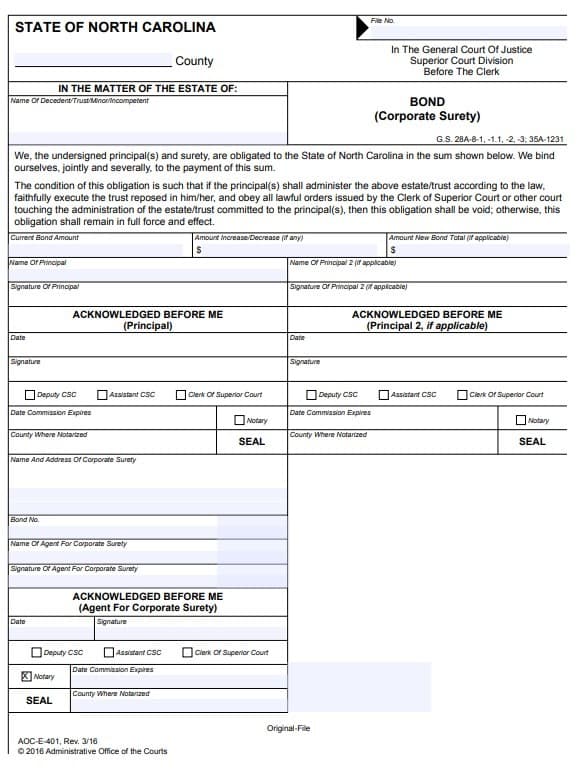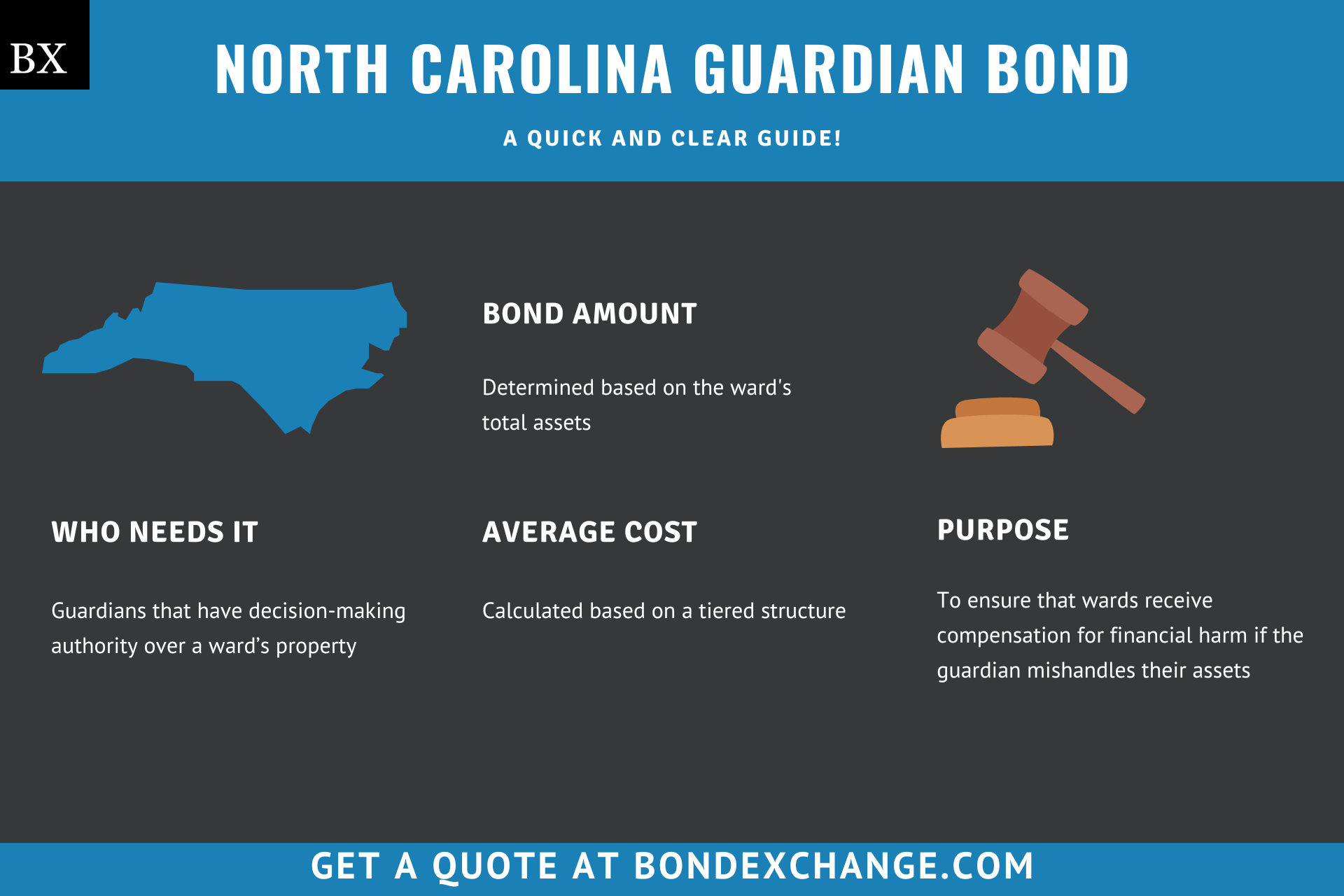North Carolina Guardian Bond: A Comprehensive Guide
This guide provides information for insurance agents to help their customers obtain a North Carolina Guardian bond.
At a Glance:
- Lowest Cost: Calculated based on a tiered structure
- Bond Amount: Determined on a case-by-case basis (more on this later)
- Who Needs It: Guardians that have decision-making authority over a ward’s property
- Purpose: To ensure that wards receive compensation for financial harm if the guardian mishandles their assets
- Who Regulates Guardian Bonds in North Carolina: The clerk of the superior court of the county where the ward resides

Background
North Carolina Statute Chapter 35A requires all persons seeking guardianship over a ward to be appointed by the clerk of a superior court before assuming their fiduciary duties. The North Carolina legislature enacted the appointment requirement to ensure that guardians properly advocate for a ward’s best interests. To provide financial security for the enforcement of this requirement, guardians that have decision-making power over a ward’s property must purchase a probate surety bond before becoming appointed as a fiduciary.
What is the Purpose of the North Carolina Guardian Bond?
North Carolina requires guardians to purchase a surety bond as a prerequisite to being appointed as a fiduciary. The bond ensures that wards will receive compensation for financial harm if the guardian fails to abide by the regulations outlined in North Carolina Statute 35A-1231. Specifically, the bond protects the ward if the guardian violates their fiduciary duties, fails to adhere to all court orders, or mismanages the ward’s property. In short, the bond is a type of insurance that protects the ward if the guardian violates their fiduciary duties.
How Can an Insurance Agent Obtain a North Carolina Guardian Surety Bond?
BondExchange makes obtaining a North Carolina Guardian bond easy. Simply login to your account and use our keyword search to find the “Guardian” bond in our database. Don’t have a login? Gain access now and let us help you satisfy your customers’ needs. Our friendly underwriting staff is available by phone (800) 438-1162, email or chat from 7:30 AM to 7:00 PM EST to assist you.
At BondExchange, our 40 years of experience, leading technology, and access to markets ensures that we have the knowledge and resources to provide your clients with fast and friendly service whether obtaining quotes or issuing bonds.
Not an agent? Then let us pair you with one!

Click the above image to find a BX Agent near you
How is the Bond Amount Determined?
North Carolina Statute 35A-1231 dictates that the bond amount for estates that are less than $100,000 must be equal to 125% of the estate’s assets. The bond amount for estates that are larger than $100,000 need only be 110% of the estate’s assets. Fiduciaries that choose not to purchase a surety bond must provide another form of financial security equal to 200% of the estate’s assets.
Can the Bond Amount be Adjusted?
Yes, as North Carolina Statute 35A-1231 states that guardians selling a ward’s property for more money than it was valued at when determining the original bond amount must increase their bond amount by 125% of the adjusted value of the property. Additionally, North Carolina Statute 35A-1233 states that guardians may reduce their bond amount if they lawfully spend or sell the ward’s assets and the clerk of the superior court approves of the adjustment. The new bond amount must be equal to 125% of the estate’s updated assets.
What are the Underwriting Requirements for the North Carolina Executor Bond?
Most surety companies will examine the following factors when determining eligibility for the North Carolina Guardian bond:
- Guardian’s credit history
- Whether or not the estate has an attorney
- Whether or not the guardian is a family member
- The guardian’s occupation
- Whether or not the guardian is replacing a prior fiduciary
- If the guardian has ever committed a felony
- Whether or not there is any ongoing business in the estate
- If the bond is being required by a creditor
- If the bond amount is greater than or equal to the estate’s value
How Much Does the North Carolina Guardian Bond Cost?
Surety companies typically determine the premium rate for guardian bonds based on a tiered structure. As a result, larger bond amounts will be charged a lower premium rate than smaller bonds.
The following table illustrates the pricing structure for the North Carolina Guardian bond:
$1,500,000 Guardian Bond Cost
| Bond Amount | Premium Rate | Total Bond Cost |
|---|---|---|
| First $20,000 | 0.75% | $150 |
| Next $40,000 | 0.60% | $240 |
| Next $140,000 | 0.50% | $700 |
| Next $300,000 | 0.375% | $1,125 |
| Next $1,000,000 | 0.25% | $2,500 |
| Total cost of $4,715 |
Who is Required to Purchase the Bond?
North Carolina requires guardians with decision-making authority over a ward’s property to purchase a surety bond as a prerequisite to becoming a court-appointed fiduciary. To paraphrase North Carolina Statute 35A-1202, a guardian is an individual or organization appointed by the clerk of a superior court to make decisions over a ward’s person and/or estate that represent the ward’s best interests. Additionally, “ward” is defined as either a minor or adult deemed incapable of making sound decisions concerning their person and/or property.
BondExchange now offers monthly pay-as-you-go subscriptions for surety bonds. Your customers are able to purchase their bonds on a monthly basis and cancel them anytime. Learn more here.
How do North Carolina Guardians Become Appointed as Fiduciaries?
Guardians in North Carolina must navigate several steps to become appointed as fiduciaries. Below are the general guidelines, but applicants should refer to the NC Judiciary Branch’s guardianship page for details on the process.
Incompetent Adult
Step 1 – File a Petition for Adjudication of Incompetence
Persons seeking guardianship over an incompetent adult must file a petition for adjudication of incompetence with the clerk of the superior court where the adult is living or domiciled. Guardians must verify the petition under oath in front of a clerk or notary public.
Step 2 – Attend a Hearing
Guardians must attend a hearing conducted by the clerk of the superior court and present evidence as to why the adult is incompetent and in need of guardianship. The clerk will examine the evidence presented by the guardian as well as that presented by the adult being evaluated (if any) and make a determination as to whether or not guardianship is necessary.
The clerk will only grant a guardianship request as a last resort and will consider other, less intrusive methods before granting one.
Step 3 – Purchase a Surety Bond
Guardians with decision-making authority over a ward’s property must purchase and maintain a surety bond (limits outlined above).
Minor
Step 1 – Complete the Application
Persons seeking guardianship over a minor must complete an application, under oath, and file it in the estates division with the clerk of the superior court of the county where the minor lives.
Step 2 – Attend a Hearing
The clerk or assistant clerk of the superior court will conduct a hearing evaluating the applicant’s guardianship claims. The applicant may present evidence to support their claim to guardianship, and other parties may present evidence opposing it. The clerk or assistant clerk will rule on the applicant’s guardianship request based on the evidence presented to them.
Step 3 – Purchase a Surety Bond
Guardians with decision-making authority over a ward’s property must purchase and maintain a surety bond (limits outlined above).
How do North Carolina Guardians File Their Bonds?
Guardians should submit their completed bond forms, including the power of attorney, to the clerk of the superior court where the ward lives or is domiciled.
The surety bond requires signatures, including witness signatures, from both the surety company that issues the bond and the applicant. The surety company should include the following information on the bond form:
- Name of the deceased
- Legal name of the entity/individual(s) buying the bond
- Surety company’s name and address
- Bond amount
- Date the bond is signed
What can North Carolina Guardians do to Avoid Claims Made Against Their Bonds?
To avoid claims against their bonds, guardians in North Carolina must ensure that they:
- Perform all of their fiduciary duties
- Obey all court orders
- Do not mismanage the ward’s assets

